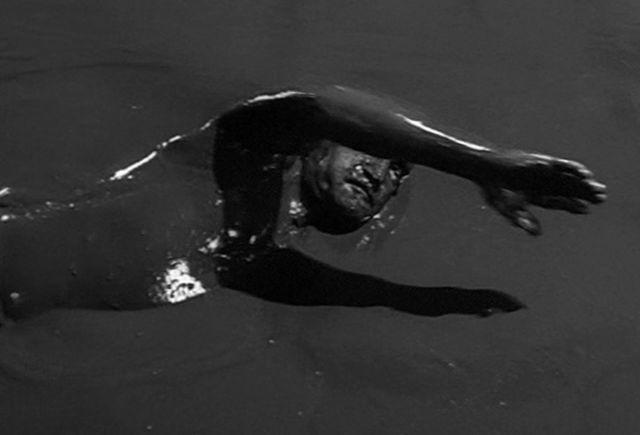Cinematographic multi-channel installation
Hydrocarbons

Hydrocarbons plunges into the complexities and contradictions of the oil era and thereby into the molecular basis of the technosphere. It is set within a multichannel installation that includes emblematic short scenes from the feature film Le salaire de la peur (The Wages of Fear, 1953). The film depicts the story of four European outcasts driving in trucks loaded with canisters full of nitroglycerin meant to extinguish a burning oil well. As a live narrator, author Priya Basil tells the background stories of the filmic interventions that are monumentalized through the use of super slow motion. Interweaving the film scenes with a variety of visual and research materials, as well as the “sounds of oil,” Hydrocarbons explores the speculative cultural genre termed “petro noir.” The section examines the geopolitical-industrial complex that drives petrochemistry and, by consequence, mobility, consumption, waste and adventure.
Program in collaboration with the group Beauty of Oil: Alexander Klose, Benjamin Steininger and Bernd Hopfengärtner
7.30 pm
Dieter Hiller
Las Piedras
Technosphere as Frontier · Industrial Knowledge · Concepts of Environment
Discussion
The first scene from Le salaire de la peur introduces the oil business as one of the most expansive technologies of modern times. The foundations of the oil industry are laid throughout the second half of the 19th and early 20th century. Around 1948, the business goes global, entering the desert, the jungle and even the seabed. Everywhere new and larger oilfields get drilled: on the Arabian Peninsula, in South America, as well as in Eastern and in Western Europe. In a discussion with oil industry expert Dieter Hiller, this section will explore the readjustment of social and political structures and ecologies caused by the introduction of drilling technologies. How have these technologies altered both nature and culture?
8.15 pm
Oxana Timofeeva
The Geo-Power of Oil
Material Power · Economies of Excess · The Capitalist Unconscious
Presentation and responses
Scene two unfolds a panorama of power relations: a monstrous figure of fire and smoke, the frantic machinery of vehicles and workers, and a group of indigenous people looking out toward the scenery. Oil work is dirty and volatile. And, more often than not, the dirtiest parts of production are located in (post)-colonial circumstances where social stratification is extreme and exploitative labor and environmental conditions organize life and land. How have these extraction processes shaped the material organization of social structures as well as the landscapes involved? Articulating these asymmetries and volatilities in terms of geopower, Oxana Timofeeva will explore the local and global, modern and premodern cults of excess, affected by the hydrocarbon industry.
8.45 pm
Jens Soentgen
Explosions
Initial Ignition · Mobilization · Cults of Combustion
Presentation and responses
The only way to extinguish a burning oil well is to explode it. From the tragic explosion of one of the trucks in Le salaire de la peur, a whole universe of sciences, industries and politics of energetic substances can be unfolded. Today, trillions of explosions happen every hour in combustion engines. Nitro- and hydrocarbon chemistry have shaped both the face of the Earth and the scope of politics on this planet by literally unbinding the molecules of the technosphere. Chemist and philosopher Jens Soentgen will demonstrate how a logic of explosion operates inside all of these mobilizations.
9.15 pm
Stephanie LeMenager, Alexander Ilitchevsky read by Marina Frenk
Oil Lake
Petro Melancholia · Easy Oil · Tough Oil · Post Oil · Petro Fear
Presentation, reading, responses
A pipeline exploded, and the leakage forms a lake. What do we see in the black mirror of an oil spill? We look back and we see lost hopes in the Western as well as in the Eastern hemisphere. Plastics are not an avant-garde matter any more, cars don't drive us into a world of the free, and fossil resources don't guarantee a society based on social equality, justice and well-being for all. Petroculture theoretician and environmental activist Stephanie LeMenager introduced the term “petro melancholia” as a description for a common state of mind in her home country, the U.S. In the fourth scene from Le salaire de la peur, she will compare this analytical concept with the implications brought forth by petro noir. Particularly for this event, author Alexander Ilitchevsky wrote Practices and Metaphysics of Oil, an essay inspired by the story Kara Bugaz (1932) of the Russian author and journalist Konstantin Paustovskij, in which he comments on the current situation of petroculture.
10 pm
Dieter Hiller, Stephanie LeMenager, Jens Soentgen, Oxana Timofeeva
Oil Man
Dark Matter · Oil-Anthropology· Petroculture Without Oil?
final discussion moderated by Alexander Klose and Benjamin Steininger
The body of a creature only vaguely human bathing in oil - has it been thrown into the unfathomable liquid or does it emerge from it? How far our modern technosphere and our modern subjectivity have been shaped by oil is often neglected. But via fertilizers and industrial agriculture, we effectively even eat oil. Industrial hydrocarbons are in our stomachs and in our veins, in our dreams and in our thoughts. They fuel mainstream and counterculture. If civilization has plunged into a global era of petroleum, has the human become an oil-based being? And are we going to get the oil out of our veins again? Do we even want this? Do we have the right concepts, yet, to understand that strange symbiosis with something that is both a fossil and modern substance?